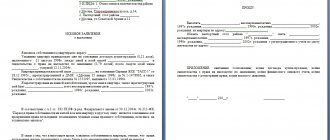Is it possible to expel a minor child from an apartment?
The question of whether the owner, if there are good reasons, can discharge a person who has not reached the age of majority, and if so, how, interests many people. Unfortunately, there is no clear answer to this; it all depends on the grounds for the emergence of housing rights and on a number of other related circumstances.
From the municipal
If the person being discharged or his parents do not own any other housing, the guardianship authority will refuse, since the minor did not exercise the legal right to participate in privatization, after which part of the living space would be at his disposal.
From privatized
Extracting from private property is also not an easy procedure. For example, if on the day of privatization a minor was already registered there, but his legal representative decided not to include the child in privatization, the latter is given the right to live in the apartment for life.
Discharge a child from a privatized apartment
When the home is owned, the question arises as to whether the child has a share. Depending on the situation, there are certain ways to remove a child from registration.
When a child is one of the owners (or even the only owner of the home), he will have to be discharged with the consent of the guardianship authorities. Official services will monitor with particular care whether the living conditions in the new housing are becoming worse, primarily for the child.
In the case where the child does not have property rights, the procedure for deregistering him becomes a little easier. However, you will have to go to the passport office to confirm the documents indicating that the child will live at the new address. If the parents have a registration certificate from their new place of residence, then such a document can also be considered confirmation. a Notary, is also suitable .
Is it possible to discharge a child to nowhere?
According to the current legislation, citizens can be discharged “to nowhere” only upon reaching the age of 18, but if he is the owner of this living space, then sometimes, in the event of its sale, a minor can be deregistered “to nowhere.” And then only with the permission of the guardianship authority and on the condition that the proceeds from the transaction will be credited to the child’s personal account and subsequently spent specifically on housing. In practice, consent to such manipulations is given very rarely.
What is needed to discharge a child? Do I need to go to court?
If there is a need for discharge, and parents or legal representatives do not object, you need to obtain permission for this procedure from the guardianship and trusteeship authorities, and then contact the territorial department of the Department of Internal Affairs of the Ministry of Internal Affairs of the Russian Federation and write a corresponding application.
If the registered representatives consider the owner’s demand to be unfounded and do not agree to voluntarily deregister with the child, then, with the support of a qualified lawyer, you must defend your legitimate interests in court.
General rules and conditions for the child’s discharge
There are a number of rules that every person who decides to initiate the discharge of children should know:
- children are always registered and discharged together with one of the parents or with a legal representative, who can be, for example, grandmothers;
- before starting the procedure, you must obtain the consent of the guardianship authority (if you are denied guardianship, you can appeal this decision in court);
- when, when the parents divorce, the child remains to live with one of them, the consent of the other is required for discharge;
- compulsory procedure is possible only by court;
- after deprivation of parental rights, the child retains the property right to the residential property in which he is registered;
- The law prohibits discharging a child “to the street”; deregistration of minors at the place of residence is possible only with the simultaneous registration of the person being discharged in a new place, and the apartment to which he is moving must be no worse in size and level of amenities than the previous one.
How to discharge an adult child from the owner’s apartment
Sometimes problems with housing last for several long years. How will the situation change with older children? In fact, there are too many different factors to describe each in detail. Even an adult child is still not considered a stranger to his parents.

If an adult does not give permission for discharge, this issue will have to be resolved in court. Here are the following grounds that give the right to deregister an adult:
- permanent absence from the registered place;
- refusal to pay utility bills (in whole or in part);
- bad behavior in society, addiction to bad habits and drug addiction;
- violation of established rules for the use of housing.
These reasons are the most common. It is with them that people often sue for the discharge of an adult child.
Instructions for discharging a child from a privatized apartment
There is a certain sequence of actions, following which you can easily discharge a minor, but only on the condition that your actions do not violate the legal rights and interests of the person being discharged.
Extrajudicial procedure
The procedure for discharging a child from privatized housing will vary somewhat depending on whether the minor is the owner or is simply registered there.
The child is the owner of the apartment
First of all, you need to collect a package of documents and obtain permission from the guardianship and trusteeship authorities.
Guardianship must be provided:
- a certificate about all persons living with the child;
- proof of home ownership;
- passport from the BTI of current housing;
- passport from the BTI of the housing to which you plan to move;
- passports of mother and father;
- birth certificate of the person being discharged;
- a duly completed application.
It may take a maximum of 2 weeks for the guardianship authority to verify the authenticity of the documents and consider the application; after this time, a decision must be made.
Then you can begin the transaction of buying and selling a home. After transferring title to the buyer, the child's parent or legal representative must initiate the release.
To do this, you need to bring a corresponding application to the passport office with a package of the following documents attached to it:
- applicant's passport;
- birth certificate of the person being discharged;
- certificates from guardianship authorities;
- certificate of ownership of the apartment.
Note! If the child is under 14 years old, the parents are required to write an application on his behalf; if the minor has already received a passport, then he has the right to write an application on his own, but his legal representatives must certify it.
Deregistration with subsequent registration at a new place of residence by the Department of Internal Affairs of the Ministry of Internal Affairs will be carried out quite quickly - within 3 working days.
The child is not the owner of the apartment
This option does not require obtaining permission for discharge from the guardianship and trusteeship authorities; it is enough to simply submit the application and all the documents from the list below to the passport office.
Required package of documents:
- statement;
- passports of parents or legal representative;
- birth certificate of the person being discharged;
- departure sheet;
- passport from the BTI for new housing.
To avoid problems with the law, parents are required to register their child at their new place of residence within 7 days. You can read more about penalties for violating registration deadlines in this article.
Judicial order
If the parents do not want to be discharged with the child voluntarily and if there are sufficient grounds for forced discharge, the owner or other interested person may apply to the court to protect their interests.
To do this, it is necessary to correctly draw up a statement of claim, attach the necessary documents to it and take everything to the district court of general jurisdiction at the location of the disputed object.
One of the parents or legal representative acting on behalf of the minor should be indicated as the defendant in the application. If the child is already 14 years old at the time of the court hearing, his presence at the trial is mandatory.
Statement of claim
The statement of claim must contain the following information:
- name of the judicial authority;
- Full name and contact details of the plaintiff (address, telephone);
- Full name and contact details of the defendant (address, telephone);
- the reason why there was a need to discharge the minor;
- specific facts of violation of the property rights and interests of the plaintiff, which he can document;
- a request to the court to satisfy the requirements for the forced discharge of a minor;
- list of attached documents.
Documents required for the court:
- receipt of payment of state duty (for 2020 its amount is 300 rubles for citizens and 6,000 rubles for legal entities);
- extract from the house register;
- documents, audio and video files that can confirm the plaintiff’s words.
All cases of the discharge of minor children are considered with the participation of a third party - the prosecutor.
Deadlines
- 5 days are given to review the application and accept it for work.
- The trial will last a maximum of 2 months.
- If the court satisfies the plaintiff’s demands, the defendants will be given exactly one month to be discharged, search for an alternative place of residence and voluntarily move, after which, at the plaintiff’s request, they can be forcibly evicted by officers of the FSSP of the Russian Federation. You can read more about court-ordered eviction in our article.
Discharge of a child from an apartment through the court
Going to court is the only alternative option for voluntarily removing a child from the apartment. The need for forced deregistration usually arises when parents divorce. Often, after separation, one of the spouses refuses to voluntarily remove the child from the register and register it at the new place of residence. The owner can only go to court for forced deregistration. District courts of the Russian Federation deal with issues of deregistration. Filing a claim is subject to a fee of 300 rubles. Only the owner of the property can act as a plaintiff. The prosecutor and a representative from the guardianship take part in the cases.
To initiate the consideration of the case, it is necessary to prepare a statement of claim and submit it to the court with attachments. The documents attached to the claim depend on the individual circumstances of the case. An application to court for the purpose of discharging a minor must be substantially justified by evidence.
Will they evict or not?
Courts in the Russian Federation adhere to the position of protecting the interests of the child. If a controversial situation arises, the decision will always be in favor of the housing and material well-being of the minor. The court cannot expel a child from the apartment without justification. Divorce of parents, when one is the owner of the property, is not considered by the court as an argument in favor of a petition for eviction. The termination of family relations between spouses does not entail the termination of family relations between parents and children.
You cannot evict a child through court if:
- The apartment is not privatized. The reason for the refusal is that in the event of privatization, the child receives ownership of the housing.
- The minor did not participate in privatization due to refusal. If privatization is refused, the right to lifelong residence in the apartment is retained.
- The baby owns a share of the apartment. The homeowner cannot be evicted against his will.
- The court will find that the plaintiff has selfish motives in the matter of evicting the child.
The list of reasons why the court may refuse is not exhaustive. However, in these cases there is no point in going to court - the decision will not be in favor of the plaintiff.
The owner has a real chance of a positive outcome if:
- The child lives with one of the parents for a long time.
- The minor's representative does not pay for utility bills.
- The child had not previously lived at his place of registration, but was only “registered.”
- The owner is not the child's parent. And the parents themselves live in another house.
- The child was adopted.
Extract by court decision
After the court decision is made, if it was in favor of the plaintiff, the minor child must be discharged from the apartment. From the moment the court makes its decision, 30 days must pass - the period for the document to come into force. If there is no dispute, the owner or tenant under a social tenancy agreement must contact the FMS office in a convenient way. The Registrar will need to submit:
- statement;
- passport;
- housing papers;
- the court's decision;
- birth certificate.
Deregistration of a minor will occur within the time period specified by law - up to 3 days.
Instructions for discharging a minor child from a municipal apartment
The guardianship authority will allow the minor to be discharged only if two conditions are met:
- after deregistration, the child will immediately be registered at the new place of residence (one of the parents or a legal representative must be registered with him);
- the new apartment will have no worse living conditions and no less area than the previous one.
In all other respects, the procedure is almost no different from the discharge of a minor owner from a privatized apartment. Only the necessary package of documents for the guardianship authority should be supplemented with a social tenancy agreement.
Is it possible to expel a mother with a minor child from an apartment: conditions and grounds
An adult (over 18 years old) can freely register and check out of a residential premises, collecting a minimum package of papers for this. Therefore, there will be no special problems with the mother’s discharge. It is much more difficult to deregister a minor citizen legally. Several conditions must be met here:
- A minor cannot be deregistered without providing the address of future registration.
- If the apartment is privatized, and the child himself turns out to be the owner, then he should be provided with compensation for his share in the real estate (in monetary or equity terms).
- The minor himself must be registered in the same place as his parents or actual guardians, that is, when registering the baby with his mother, he must be registered at the place of the citizen’s future registration.
- If a citizen is over 14 years of age, he has the right to independently fill out an application and attend all proceedings regarding his deregistration.
The basis for organizing deregistration may be the sale of an apartment, a change in the actual place of residence of adults, that is, mother and father, or the death of a parent and child (in this case, deregistration may occur automatically).
The Government Decree “ On the rules of registration and deregistration ” No. 512 of April 23, 1996 strictly stipulates that the interests of the child should not be infringed upon in the process of discharge and subsequent change of registration.
That is, if adults can be discharged from full-fledged housing into communal real estate, then this is unacceptable for a minor. The living conditions of the baby should not change for the worse. Otherwise, the guardianship and trusteeship authorities, together with the migration service, have the right to file a claim for violation of the rights of the child.
At the new place of registration, the minor should be offered the same living area or a larger one (that is, if in the old apartment the little one had 12 square meters at his disposal, then in the new apartment his living conditions should not become worse).
If, when selling real estate, there is no subsequent purchase of housing , then a certain amount from the transaction must be transferred to the baby’s personal account.
Is it possible to expel a minor child and his mother from the apartment? Only if the legality of such actions is observed. If modern legislative bodies sometimes turn a blind eye to respecting the interests of an adult, then harming the interests of a child will certainly not escape the attention of the guardianship authorities.
Can they refuse to discharge children?
There are situations when the discharge of even a child temporarily registered in an apartment will be refused not only by the guardianship authorities, but also by the court. For example, in these:
- deregistration of a child and his subsequent registration in an apartment with worse living conditions;
- discharge of a minor “to nowhere.”
If guardianship officials “accidentally” do not monitor compliance with these rules and allow a discharge that violates the legal rights and interests of the child, any interested person can appeal the decision of the negligent employee in court.
Arbitrage practice
Each such case involving minors is considered individually, and a decision is made after a detailed analysis of the circumstances surrounding deregistration. As an example, let's look at a case where a child was nevertheless discharged by the court, although he did not own any real estate.
Example. Taking advantage of the State Program “Young Family”, the Tsvetkovs received an apartment in an apartment building under a social tenancy agreement. But after starting to complete the paperwork, the happy family discovered that the previous tenants were still registered in this living space - a mother and her minor child, although in fact the premises had been empty for more than eight years. The internal condition of the housing was very poor - glass was missing almost everywhere, there were no interior doors, and the wiring had long since broken down.
After the former tenants were found and officially notified that new tenants were moving in, they did not agree to check out voluntarily and asked the Tsvetkovs for an impressive sum of money for refusing to register.
The latter had no choice but to go to court to discharge the former residents without the latter’s consent. The Tsvetkovs listed several facts in their statement of claim as grounds for eviction of the defendants:
- mother and child do not live at their place of registration for a long time;
- more than eight years of rent arrears have accumulated;
- Due to the fault of the previous residents, the condition of the apartment fell into disrepair.
After considering all the circumstances and evidence in the case, the claim was satisfied, and the defendants were successfully discharged by the Department of Internal Affairs of the Ministry of Internal Affairs on the basis of a court order within a few days.








